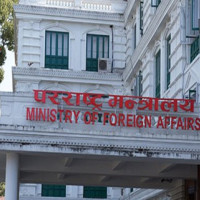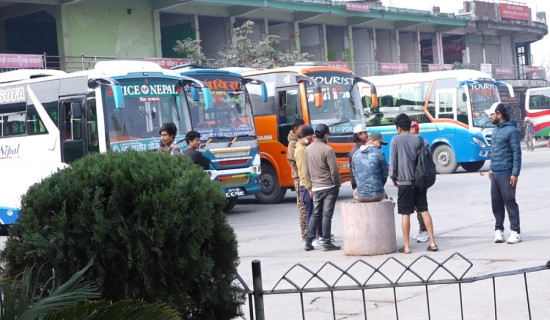- Wednesday, 4 March 2026
Excitement of Bethi celebration in paddy plantation
By Kabiraj Ghimire,Hile, July 20: Until four decades ago, an electric atmosphere used to envelop the villages of Dhankuta during the monsoon. When the rain poured, villagers would gather in the fields to plant paddy, musicians would play the traditional Naumati musical instruments, sing folk songs and make merry in a ceremony traditionally called 'Bethi'.
The monsoon still comes every year and farmers still plant the crops. But the atmosphere is no longer electric because the Bethi tradition has all but disappeared. In fact, the word itself has gone out of circulation. Even the children of farmers understand the word any longer. The songs no longer fill the air and the melody of musical instruments does not echo across the farms. According to elders, the tuneful tradition was in existence until the 1980s. After that, supposed modernisation took hold.
Senior citizens of the district still reminisce about Bethi. It was a festival that reflected the connection between human life and the earth. That is why, as the musicians played and the youths danced, farmers put the mud on their foreheads and worshipped the land that gave them and everyone else food.
Bethi was also a communal affair. "Everyone would contribute to making the occasion festive," Bholanath Ghimire of Teliya, Dhankuta remembered. "Some would sing, some would dance, some would level the field, some would channel water into the field and some would transplant seedlings. People would splash mud on each other and share a hearty laugh," he reminisced.
"But, gradually life got hectic, young people migrated to cities for opportunities, I, too, left the village," Ghimire remarked with sadness. "Even after a long day of farm work, people never felt tired because Bethi made everything enjoyable."
"Oh, Bethi was indeed an ecstasy!" Gyan Bahadur Thapa of Bhirgaun, Dhankuta Municipality–2, expressed. He informed that people would invite their daughters to celebrate Bethi with them, put mud Tika on their foreheads, and give them paddy panicle and money.
Similarly, Thapa said that Bethi was exempt from the Parma system of labour exchange. Usually, when a farmer received help from his peers for planting and harvesting crops, he or she would be obligated to help his helpers plant and harvest too. This is what Parma system is.
"But there were no such obligations for those who assisted in planting during Bethi," he said. "Families would hold a feast and everyone in the field would enjoy a delicious meal."
Slowly though, people started valuing money. Villagers started demanding monetary and non-monetary benefits, especially when rich farmers or landlords invited them.
Bethi took on a class dimension and started being looked at as a festival for the wealthy and those who held much land. It began declining from the late 1980s and today, has almost completely died.
"We need to preserve this part of our culture," urged Khel Bahadur Limbu, a farmer in Sagurigadhi, Dhankuta. But Limbu said that Asar 15 did manage to capture some essence of Bethi.















